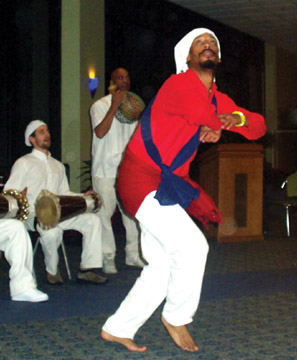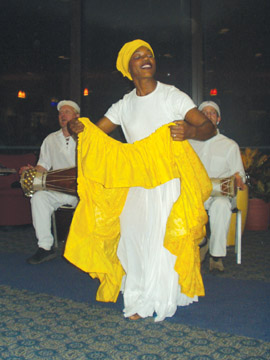UMass Boston’s Casa Latina, a campus group for students of Latino heritage, held an Afro-Cuban Festival in the Ryan Lounge on Monday, October 27. The event featured music, dancing, and an audience participation workshop on drumming and dance.
The event also served as a practicum for Sociology Professor Glenn Jacob’s class on Afro-Cuban Music and Religion. The festival centered on the Yoruba religion, a West African tradition from the region of Nigeria, which came to Cuba with the slaves. The slave masters attempted to convert the slaves to Christianity by substituting Christian saints for the many Yoruban deities. The religion adapted and survived nonetheless. Orisha, for instance, one of many Yoruban deities, became the staidly Catholic Santo Barbare in name, but remains Orisha in the hearts of believers. This type of incorporation resulted in an intriguing fusion of cultural and religious traditions.
“The Catholics,” explained Professor Jacobs, “Tell you that they simply used Yoruba to teach Catholicism. The slaves and their descendants have a different slant on it, asserting that they accepted a veneer of Catholicism in order to maintain their Yoruba tradition.” Professor Jacobs has been in Cuba “five or six times,” having recently lived in Havana for two months in order to continue his study the faith, of which he is also an ordained priest.
The dance and drum troupe, some fourteen or fifteen dancers and percussionists under the direction of Cuban-born dance instructor Reynaldo Gonzales, played and danced the religious music of Yoruba. The performers, decked out in white with accents of brilliant color here and there, encouraged and received enthusiastic audience participation.
The music was remarkably syncopated, with hip swinging, toe-tapping, sinuous production that reminded the listener Cuba gave the world the mambo, the cha-cha, the habanera, and more. These styles contributed generously to contemporary salsa and jazz.
Dance instructor Gonzalez stated that he, “works for a number of different universities including Harvard, Brown, and Tufts, as an instructor in the folk traditions and dance of Yoruba.” He and his group have performed in a number of churches and community centers. Dancer and UMB student Anna Walters says, “Performing with the dance troupe, a group known as Rad (‘root’), fits well with my anthropology major.” UMB graduate student Lindsey Ericson noted that, “The study of the dance and music of other cultures can bring us together.”
In this same vein, Glenn Jacobs stated that the festival itself is not just a class project, it demonstrates respect for the great diversity of UMB students. “We should have more such things,” he continued. “Our music department would do well to recognize that we need to perform the music of the communities we serve.”
The event was catered by a local ethnic restaurant which offered spicy and tantalizing Cuban chicken, plantains, black beans and rice, and empañatas (meat pies), authentic and delicious fare.
This celebration of our diversity served to inform, entertain, and provoke thought. The slaves of Cuba found hope in Yoruba, whose music, religious practices and cultural tradition, helped those unwilling immigrants survive what now seems intolerable.


